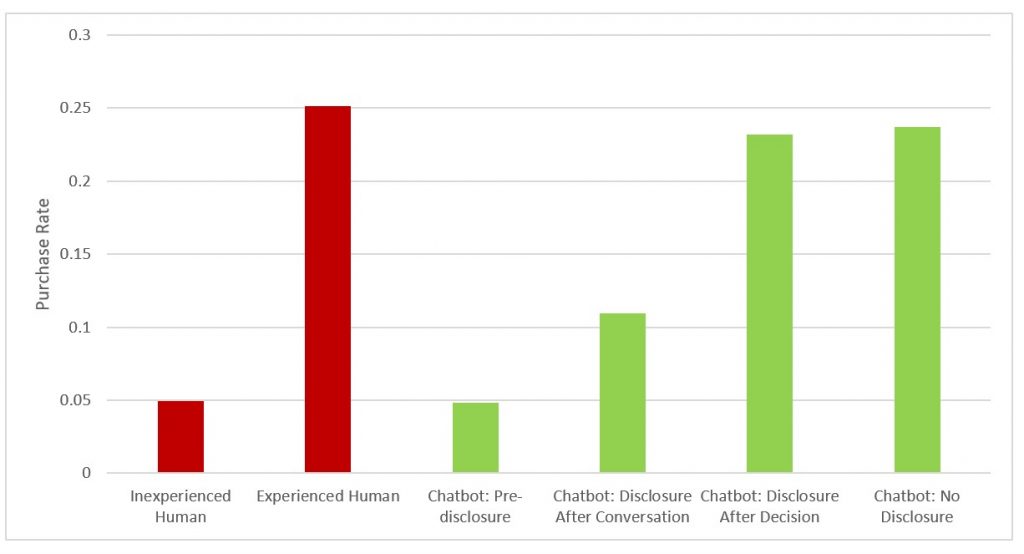Whenever technology progresses a major question arises: What can technology do as well, or better, than humans? Since the luddites, and probably before, people reacted to technology with hostility. This raises the question whether machine learning algorithms can replicate (or outperform human behavior) but still be unpopular due to human reaction. A group of authors writing in Marketing Science thus looked at the impact of chatbot identity disclosure. Basically they wanted to know whether chatbots are as effective when you tell customers they are dealing with bots.
Chatbots Can Replicate Experienced Humans
In many ways one might predict the impact of chatbot identity disclosure to be zero. This is not because people like bots. Instead, zero effect would come because it can be pretty obvious you are dealing with a bot so why would disclosing this fact matter? It is worth marveling that we are at a point where bots can fake being human i.e. pass the Turing test. This is especially true as the research we are looking at was conducted with an outbound call center. It was not just text responses, the bot had to fake the voice too. To be clear the calls were short and very structured. Given these conditions even the humans who make the calls can sound a bit artificial at times. Yet still, that we have the problem of whether to confess to being a bot is quite a technological marvel.
The Impact Of Chatbot Indentity Disclosure: It Isn’t Good
So Xueming Lou and his colleagues compared the work of human call centre operators with chatbots on outbound loan sales calls. They considered experienced and inexperienced human callers. Unsurprisingly the experienced humans were much better that their novice colleagues. What was more surprising is that when the customers were not told it was a chatbot the bots performed as well as the experienced callers. (Again it is worth noting these calls were relatively structured. The bots probably would have done worse if the calls we much more varied but this boundary is being pushed back each year).
The researchers looked at four chatbot conditions. 1) no disclosure (customers never told they were speaking to a chatbot), 2) customers told at the beginning of the call, 3) customers told after the converation (but before customer’s decision), or 4) customers told after the decision made. Telling customers before the conversation made the bots’ effectiveness similar to the inexperienced callers. Telling after the conversation gave middling success. Not disclosing, or disclosing after the customer had already decided were both similar in success to the experienced human callers. (Remember that using the bot comes at a fraction of the cost).
….undisclosed chatbots are as effective as proficient workers and four times more efffective than inexperienced workers in engendering customer purchases. However, the disclosure of chatbot machine indentiy before conversation reduces purchase rates by more than 79.7%.
Luo, Tong, Fang and Qu, 2019, page 938)

Prejudice Against The Machine
What does this mean? Well even if they are as good as the best humans the customers still don’t like interacting with chatbots, when they know they are bots. Of course, this could — likely will? — change with time. Eventually the luddites stopped smashing the machines. (To be clear I am not saying we don’t need to think about how we help those whose jobs are likely to replaced by machines. This is an important social issue just we seem likely to get more relaxed about the technological applications over time).
In the meantime marketers may want to think about what they disclose about their use of technology. (Obviously local laws will have a major impact on this). It also opens business possibilities. Can you make a business promising only human callers? Can you give better rates to those who can get past their anti-machine prejudice and accept the bots given this saves the firm money? Interesting times and it is great to see marketers being a part of the thinking.
For more on machine learning see here.
Read: Xueming Luo, Siliang Tong, Zheng Fang, Zhe Qu (2019) Frontiers: Machines vs. Humans: The Impact of Artificial
Intelligence Chatbot Disclosure on Customer Purchases, Marketing Science 38(6):937-947. https://doi.org/10.1287/mksc.2019.1192
